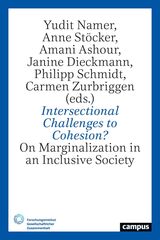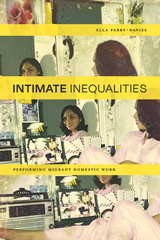3 books about Critical Interventions
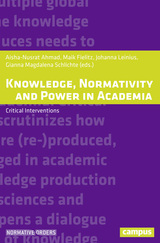
Knowledge, Normativity and Power in Academia
Critical Interventions
Edited by Aisha-Nusrat Ahmad, Maik Fielitz, Johanna Leinius and Gianna Magdalena Schlichte
Campus Verlag, 2018
Despite its capacity to produce knowledge that can directly influence policy and affect social change, academia is still often viewed as a stereotypical ivory tower, detached from the tumult of daily life. Knowledge, Normativity, and Power in Academia argues that, in our current moment of historic global unrest, the fruits of the academy need to be examined more closely than ever. This collection pinpoints the connections among researchers, activists, and artists, arguing that—despite what we might think—the knowledge produced in universities and the processes that ignite social transformation are inextricably intertwined. Knowledge, Normativity, and Power in Academia provides analysis from both inside and outside the academy to show how this seemingly staid locale can still provide space for critique and resistance.
[more]
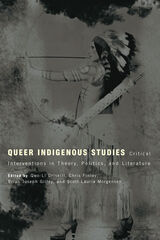
Queer Indigenous Studies
Critical Interventions in Theory, Politics, and Literature
Edited by Qwo-Li Driskill, Chris Finley, Brian Joseph Gilley, and Scott Lauria Morgensen
University of Arizona Press, 2011
“This book is an imagining.” So begins this collection examining critical, Indigenous-centered approaches to understanding gay, lesbian, bisexual, transgender, queer, and Two-Spirit (GLBTQ2) lives and communities and the creative implications of queer theory in Native studies. This book is not so much a manifesto as it is a dialogue—a “writing in conversation”—among a luminous group of scholar-activists revisiting the history of gay and lesbian studies in Indigenous communities while forging a path for Indigenouscentered theories and methodologies.
The bold opening to Queer Indigenous Studies invites new dialogues in Native American and Indigenous studies about the directions and implications of queer Indigenous studies. The collection notably engages Indigenous GLBTQ2 movements as alliances that also call for allies beyond their bounds, which the co-editors and contributors model by crossing their varied identities, including Native, trans, straight, non-Native, feminist, Two-Spirit, mixed blood, and queer, to name just a few.
Rooted in the Indigenous Americas and the Pacific, and drawing on disciplines ranging from literature to anthropology, contributors to Queer Indigenous Studies call Indigenous GLBTQ2 movements and allies to center an analysis that critiques the relationship between colonialism and heteropatriarchy. By answering critical turns in Indigenous scholarship that center Indigenous epistemologies and methodologies, contributors join in reshaping Native studies, queer studies, transgender studies, and Indigenous feminisms.
Based on the reality that queer Indigenous people “experience multilayered oppression that profoundly impacts our safety, health, and survival,” this book is at once an imagining and an invitation to the reader to join in the discussion of decolonizing queer Indigenous research and theory and, by doing so, to partake in allied resistance working toward positive change.
The bold opening to Queer Indigenous Studies invites new dialogues in Native American and Indigenous studies about the directions and implications of queer Indigenous studies. The collection notably engages Indigenous GLBTQ2 movements as alliances that also call for allies beyond their bounds, which the co-editors and contributors model by crossing their varied identities, including Native, trans, straight, non-Native, feminist, Two-Spirit, mixed blood, and queer, to name just a few.
Rooted in the Indigenous Americas and the Pacific, and drawing on disciplines ranging from literature to anthropology, contributors to Queer Indigenous Studies call Indigenous GLBTQ2 movements and allies to center an analysis that critiques the relationship between colonialism and heteropatriarchy. By answering critical turns in Indigenous scholarship that center Indigenous epistemologies and methodologies, contributors join in reshaping Native studies, queer studies, transgender studies, and Indigenous feminisms.
Based on the reality that queer Indigenous people “experience multilayered oppression that profoundly impacts our safety, health, and survival,” this book is at once an imagining and an invitation to the reader to join in the discussion of decolonizing queer Indigenous research and theory and, by doing so, to partake in allied resistance working toward positive change.
[more]
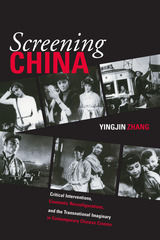
Screening China
Critical Interventions, Cinematic Reconfigurations, and the Transnational Imaginary in Contemporary Chinese Cinema
Zhang Yingjin
University of Michigan Press, 2002
When Chinese films are screened in the West, viewers often prize, debate, and critique the “Chineseness” presented therein. Critics, scholars, and cultural theorists, too, latch onto the ethnic and cultural markers in Chinese film, often applying their theories as if they were universally applicable and even independent of history. They study only a small number of films from a large body of available works, often with a unidirectional Eurocentric bias. As a result, Chinese filmmakers are caught between the Western consumer and critical demand for ethnic and cultural images and the local restrictions of economics and politics.
Screening China follows filmmakers’ efforts to reconfigure China and position their work between the global and the local. In Part I, Yingjin Zhang catalogs the lenses Western film critics have used to break down, neatly package, and closely scrutinize China. One of the chief examples is the narrative of Communist Party censorship in which the regime notoriously represses artists and repeatedly violates human rights. In Part II of Screening China, Zhang narrates how New Chinese Cinema struggled to break free of the ethnic and cultural representation sought by Western audiences, introducing readers to the numerous Chinese filmmakers who have used the space opened up by New Chinese Cinema to present China in all its social, historical, political, ethnic, cultural, and economic facets.
[more]
READERS
Browse our collection.
PUBLISHERS
See BiblioVault's publisher services.
STUDENT SERVICES
Files for college accessibility offices.
UChicago Accessibility Resources
home | accessibility | search | about | contact us
BiblioVault ® 2001 - 2025
The University of Chicago Press




